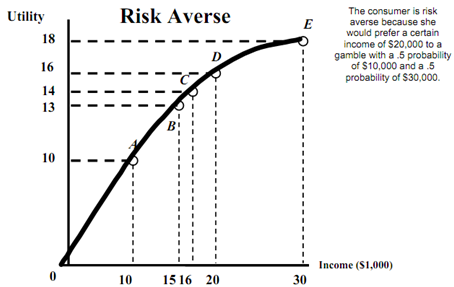Risk Averse:
- A person who prefers certain given income to risky income with same expected value.
- A person is careful risk averse if they have a diminishing marginal utility of income
- The use of insurance demonstrates the risk aversive behavior.
* Risk Averse: A Scenario
- A person have a $20,000 job with 100% probability and receive utility level of 16.
- The person could have a job with the .5 possibility of earning $30,000 and a .5 possibility of earning $10,000.
* Expected Income =
(0.5)($30,000) + (0.5) ($10,000) = $20,000
* Expected income from both the jobs is same -- risk averse may choose present job
* The expected utility from new job is found:
- E(u) = (1/2)u ($10,000) + (1/2)u($30,000)
- E(u) = (0.5)(10) + (0.5)(18) = 14
- E(u) of Job 1 is 16 which is greater than the E(u) of Job 2 which is 14.
* This individual would keep their current job as it provides them with more utility than the risky job.
* They are called as risk averse persons.
